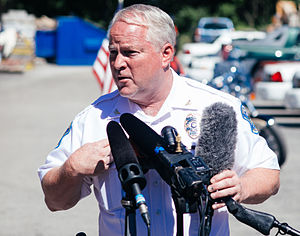Thomas Jackson (police chief, Ferguson, MO): Difference between revisions
George Swan (talk | contribs) (more details) |
George Swan (talk | contribs) (more details) |
||
| Line 21: | Line 21: | ||
| footnotes = | | footnotes = | ||
}} | }} | ||
'''Thomas Jackson''' is a former police officer.<ref name=cbc2015-03-11A/> He was the Chief of Police of [[Ferguson, Missouri]] when one of his officers, [[Darren Wilson]], killed an 18 year-old black man, [[Michael Brown (youth)|Michael Brown]], on August 9, 2014. He had been Chief since 2010. His department included 54 police officers. | '''Thomas Jackson''' is a former police officer.<ref name=cbc2015-03-11A/><ref name=CtvFergusonFigures/> He was the Chief of Police of [[Ferguson, Missouri]] when one of his officers, [[Darren Wilson]], killed an 18 year-old black man, [[Michael Brown (youth)|Michael Brown]], on August 9, 2014. He had been Chief since 2010. His department included 54 police officers. | ||
The killing triggered outrage, and protests.<ref name=cbc2015-03-11A/> | The killing triggered outrage, and protests.<ref name=cbc2015-03-11A/><ref name=CtvFergusonFigures/> Jackson's response to community outrage was seen as heavy-handed, as it included tear gas and riot squads. Jackson resigned after a scathing report from the [[US Department of Justice]] criticized systemic racism within his department. His was the sixth resignation after the killing. | ||
Jackson published a book about the incident, in July 2017, entitled ''“Policing Ferguson, Policing America: What Really Happened — and What the Country Can Learn From It.”''<ref name=stltoday2017-07-29/> Primary premises of the book include the assertion that officer Wilson was justified to use deadly force, and he did so in an appropriate manner; and that Wilson, Jackson himself, and all other local policemen, were unfairly demonized by a hostile and irresponsible press. He was critical of [[Attorney General]] [[Eric Holder]], who he argued, lead a premature rush to judgement. | Jackson published a book about the incident, in July 2017, entitled ''“Policing Ferguson, Policing America: What Really Happened — and What the Country Can Learn From It.”''<ref name=stltoday2017-07-29/> Primary premises of the book include the assertion that officer Wilson was justified to use deadly force, and he did so in an appropriate manner; and that Wilson, Jackson himself, and all other local policemen, were unfairly demonized by a hostile and irresponsible press. He was critical of [[Attorney General]] [[Eric Holder]], who he argued, lead a premature rush to judgement. | ||
| Line 64: | Line 64: | ||
</ref> | </ref> | ||
<ref name=CtvFergusonFigures> | |||
{{cite news | {{cite news | ||
| url = | | url = https://www.ctvnews.ca/world/ferguson-key-figures-in-the-michael-brown-case-1.2113490/comments-7.581808/comments-7.581808/comments-7.581808 | ||
| title = | | title = Ferguson: Key figures in the Michael Brown case | ||
| work = | | work = [[CTV News]] | ||
| author = | | author = | ||
| date = | | date = | ||
| Line 79: | Line 80: | ||
| accessdate = 2022-07-19 | | accessdate = 2022-07-19 | ||
| url-status = live | | url-status = live | ||
| quote = | | quote = Thomas Jackson was a police veteran long before he came to Ferguson. He spent more than 30 years with the St. Louis County Police Department, at one point serving as commander of a drug task force. Before that he was a SWAT team supervisor, undercover detective and hostage negotiator. | ||
}} | }} | ||
</ref> | </ref> | ||
}} | }} | ||
Revision as of 07:15, 20 July 2022
| Thomas Jackson | |
|---|---|

| |
| Occupation | Chief of Police |
| Salary | $100,000 in 204 |
Thomas Jackson is a former police officer.[1][2] He was the Chief of Police of Ferguson, Missouri when one of his officers, Darren Wilson, killed an 18 year-old black man, Michael Brown, on August 9, 2014. He had been Chief since 2010. His department included 54 police officers.
The killing triggered outrage, and protests.[1][2] Jackson's response to community outrage was seen as heavy-handed, as it included tear gas and riot squads. Jackson resigned after a scathing report from the US Department of Justice criticized systemic racism within his department. His was the sixth resignation after the killing.
Jackson published a book about the incident, in July 2017, entitled “Policing Ferguson, Policing America: What Really Happened — and What the Country Can Learn From It.”[3] Primary premises of the book include the assertion that officer Wilson was justified to use deadly force, and he did so in an appropriate manner; and that Wilson, Jackson himself, and all other local policemen, were unfairly demonized by a hostile and irresponsible press. He was critical of Attorney General Eric Holder, who he argued, lead a premature rush to judgement.
References
- ↑ 1.0 1.1 Ferguson police Chief Thomas Jackson resigns after scathing report, CBC News, 2015-03-11. Retrieved on 2022-07-19. “The resignation of Chief Thomas Jackson was the latest in a string of departures since the Justice Department said on March 4 that a months-long probe had uncovered a range of unlawful and unconstitutional practices in the St. Louis suburb.”
- ↑ 2.0 2.1 Ferguson: Key figures in the Michael Brown case, CTV News. Retrieved on 2022-07-19. “Thomas Jackson was a police veteran long before he came to Ferguson. He spent more than 30 years with the St. Louis County Police Department, at one point serving as commander of a drug task force. Before that he was a SWAT team supervisor, undercover detective and hostage negotiator.”
- ↑ Harry Levins. Ex-police chief tells his own side of Ferguson shooting, St. Louis Post-Dispatch, 2017-07-29. Retrieved on 2022-07-19. “Jackson has written a book that swerves from anger at what he sees as unfair condemnation of his police force to some well-reasoned thoughts on how police departments and communities can get along better.” mirror